Japan Trip 2010-Day 7
Maya sent us off in a taxi this morning on a home visit along with Nita and Janet, our fellow Californians, and an envelop containing her phone number and the hotel’s, the address of our destination, and 5 new 1000 yen bills to pay the fare.
We were let out at a non-descript looking house in a dense residential neighborhood and invited in with broad smiles by a couple carrying umbrellas and signing to remove shoes. “My name is Kane, like Citizen Kane,” laughed the host. “This is my wife Akiko, who speaks no English.”

He led us down a narrow corridor to the formal tatami reception room and immediately out the back door to the garden, where we donned slippers for the first stage of the tour. It was like a miniature Kenrokuen, packed with striking rocks, artfully shaped trees, stone lanterns, winding pathways and several water features.

The rocks, he informed us, were purchased from a garden supply store and delivered with a crane from the back alley. The larger trees were pruned by professionals and he handled the shrubs and delicate bonsais. Behind a screen was his flower and vegetable garden and across the alley, Akiko grew 100 varieties of prize-winning roses.
Back in the parlor we sat around the table in low chairs and Akiko brought green tea and a sweet wrapped in a pickled cherry leaf.
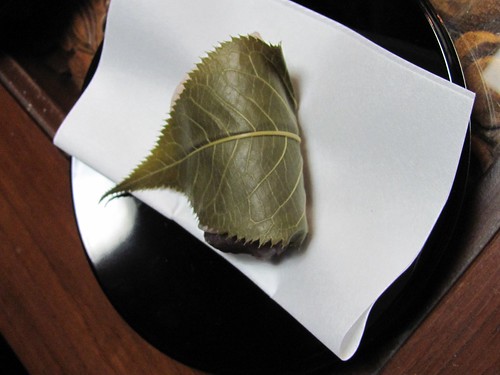
We each were presented with gifts: a lovely ceramic cup and a CD about Japanese cooking, and in turn presented what we had brought, in our case the wrapped Trader Joe’s chocolate bar seeming not quite up to par.
Kano passed out his card and asked us where we were from. When he heard California, he laughed and told us that he recently returned from San Diego, where he went in his capacity as a Rotarian District Leader. Jan replied that she too was a Rotarian and from her purse dug out a pin in the shape of a sushi roll she’d been given at a convention by a delegate from Japan and handed it to him. I was relieved. He laughed louder than ever and gave Akiko a command in Japanese. She returned with a plate full of Rotary pins that he passed out to everybody.
After tea, he stood up and showed us a beautiful scroll in the alcove painted by his calligraphy teacher.
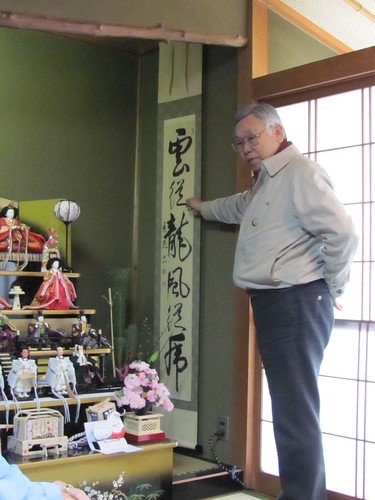
He explained the meaning of the kanji, which included a maxim on the importance of humility””not like George W. Bush for example,” he laughed. Jan and I laughed loudly with him and Nita and Janet smiled politely. He would return to making derogative remarks about our former president several times during the visit.
Next he moved to the elaborate Buddhist altar in another corner of the room, flanked by antique looking photos of his and Akiko’s parents.

We’d earlier learned that the production of these altars, popular throughout Japan was a traditional Kanazawa industry. “Very expensive,” he said. It was purchased by his mother with money from a life insurance policy. He explained various implements on the altar, including a book of prayers sung every morning. At Jan’s request he chanted one.
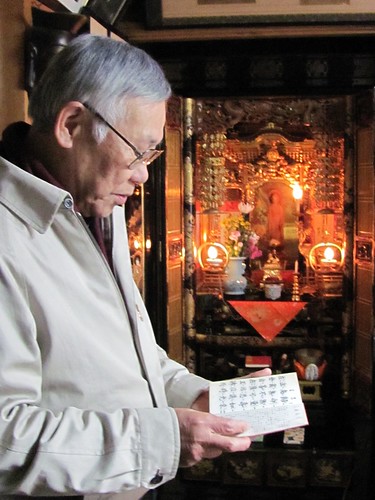
I could have listened for a long time. Then he placed our gifts on the altar, “as an offering,” he stated.
Led now into the western-style portion of the house, we entered a family room adjoining the kitchen, containing computer, TV, and an American short-haired cat. “I’m a horse maniac,” he laughed, pointing to paintings of horses decorating the walls. “I drew them.” Other horse portraits were done in needlepoint by Akiko. Across a tiny enclosed garden was the adjoining unit now inhabited by his son’s family, including grandchildren. Back out in the chilly vestibule he gestured toward a large wooden frieze of carved horses. “I did those too.”

Then up the steep stairs to a former child’s room housing more horse paraphernalia, Akiko’s gold medals for roses, and above the door a little Shinto shrine. “This is for prayers of hope, the other one for thanksgiving. Here we pray for peace, long life, health, and a little bit of money, not too much. Remember humility. Also for the Emperor and his family. They are the oldest royal family in the world.”

Next he conducted us to the bedroom, where futons are pulled out of the closet and placed on the floor at night. “The cat sleeps between us,” he laughed. “Keeps us from making babies.”
Ignoring Nita’s concern that we get back to our hotel in time, he said “Don’t worry, I’ve got it under control,” and led us to a high-ceilinged office, where formerly he conducted his real-estate business, now his son’s. He and Akiko ushered us to sit on leather couches around another low table and she brought more tea”this time a combination of hibiscus, rose hips and strawberry””lots of vitamin C”–and delicate rice cookies. As we sipped, he took out his calligraphy set and effortlessly inked four characters on white cards bordered in gold leaf, one for each of us.
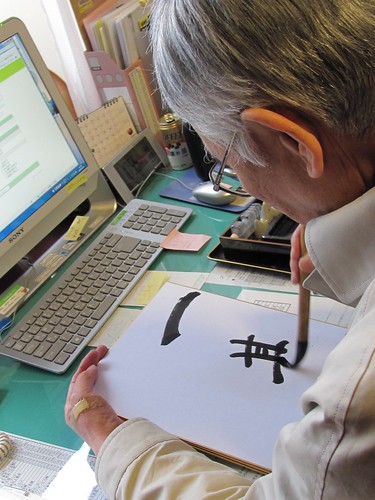
“The kanji signify this,” he explained. “˜One life, One encounter.’ It’s a Buddhist saying that applies to what has just taken place in this house.” The room was silenced by the resonance of that proverb in that moment.
After a pause, I mentioned that it expresses how I feel about every class that I teach. Nita said she’s been on fifteen home visits with OAT, but this has been the best. Akiko brought in elegant little shopping bags to pack up our gifts.
The cab was now waiting, and as he led us out the door of the office, Kano said, “this is most important,” and pointed to a fuzzy picture of a bunch of people in suits. His and Akiko’s faces were recognizable in the crowd. In the foreground a distinguished gray-haired man was bowing.

“Who is that,” he asked? Jan said, “Is it the prince?” “No,” he said, “that’s the Emperor.” He’d been at a meeting of the equestrian society to which the emperor belongs, where taking pictures was forbidden, but his friend snapped this one and then ran away, “like a papparazzi.”
Back to the hotel we zipped to meet Maya and the rest of the group and off to the train to Kyoto. On the way the sun came out briefly and made a rainbow over lake Biwa.

Jan and I read and reread the Kabuki play’s summary downloaded from the internet without full comprehension, since it was a sequel with many allusions to earlier scripts. The cab driver from the Kyoto station remarked on the theatre’s name we showed him with approval and said, “Empera here.” Deploying her six-word vocabulary in Japanese, Jan said “Sakura,” meaning Cherry blossoms. The driver nodded emphatically. On the way along the river, we could see them in glorious bloom, about two weeks earlier than usual. Cherry blossoms in Kyoto is the number one attraction in Japan according to our authoritative Lonely Planet guidebook. Anthony said our tour was $2000 cheaper than the one during the expected Sakura period.
We arrived at the beautiful old theatre about 30 minutes late, but the tickets were waiting at the box office.
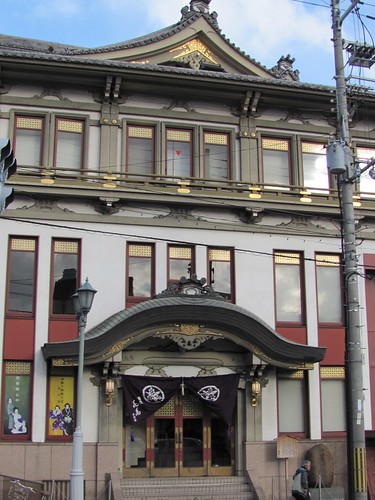
We rushed upstairs to our seats in the last row of the top balcony. The set was brilliantly lit and colored”a stylized version of the cherry blossom scene outside, itself a stylized version of a natural landscape.

The sets changed magically”one of the attractions of Kabuki”as did the costumes of the lead actor who played seven roles, both male and female. There was lots of action, some of which we understood, including the accidental murder of the queen and the escape of the well-meaning perpetrator through a stormy sea created by windblown silk banners.

During our hasty entry I saw no prohibition on picture taking, so I snapped a few with the flash down, but an usher dashed upstairs to ask me please to stop. Now I was paparazzi.
At the first intermission, we bought delicious sushi in a Styrofoam bento box, joining the other audience members in getting nourishment during the four and a half hour performance. We were the only Caucasians in sight. The next act may have explained why. The set was a dimly lit scene in a humble farmhouse. The assassin was told of his error by the visiting courtier who deceived him earlier and who placed a sword in front of him. For the next hour, the disgraced murderer lamented his dishonor and worked up to committing seppuku with the sword, in the presence of his blind albino child and his grieving sister. As they wept beside him, he did the deed, and it took the next 50 minutes of his incomprehensible groaning for him to finally die.
The remainder of the sushi tasted especially good at the next intermission, which was followed by a short final act, which included a swordfight ballet, brilliant acrobatics, the ascent of a ghost in a beautiful kimono to heaven, two more relatively brief seppukus, and the final vaporizing of the ghost as a result of the Emperor’s flashing it with a small image of Buddha.
